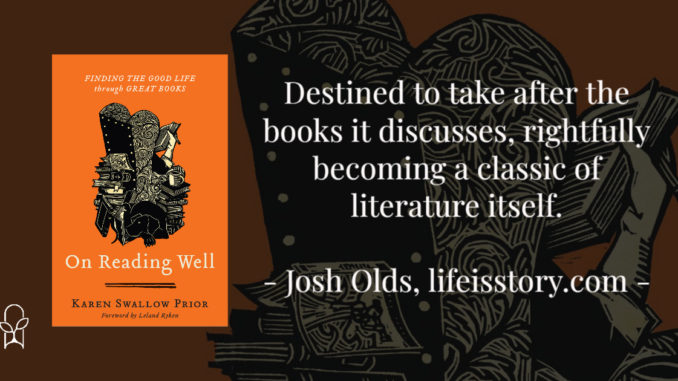
Also by this author: Jane Eyre: A Guide to Reading and Reflecting, The Evangelical Imagination: How Stories, Images, and Metaphors Created a Culture in Crisis
Published by Brazos Press on February 1, 2022
Genres: Non-Fiction
Buy on Amazon
Goodreads

★
Publishers Weekly
starred reviewA Best Book of 2018 in Religion,
Publishers Weekly
Reading great literature well has the power to cultivate virtue. Great literature increases knowledge of and desire for the good life by showing readers what virtue looks like and where vice leads. It is not just what one reads but how one reads that cultivates virtue. Reading good literature well requires one to practice numerous virtues, such as patience, diligence, and prudence. And learning to judge wisely a character in a book, in turn, forms the reader's own character.
Acclaimed author Karen Swallow Prior takes readers on a guided tour through works of great literature both ancient and modern, exploring twelve virtues that philosophers and theologians throughout history have identified as most essential for good character and the good life. In reintroducing ancient virtues that are as relevant and essential today as ever, Prior draws on the best classical and Christian thinkers, including Aristotle, Aquinas, and Augustine. Covering authors from Henry Fielding to Cormac McCarthy, Jane Austen to George Saunders, and Flannery O'Connor to F. Scott Fitzgerald, Prior explores some of the most compelling universal themes found in the pages of classic books, helping readers learn to love life, literature, and God through their encounters with great writing. In examining works by these authors and more, Prior shows why virtues such as prudence, temperance, humility, and patience are still necessary for human flourishing and civil society. The book includes end-of-chapter reflection questions geared toward book club discussions, features original artwork throughout, and includes a foreword from Leland Ryken.
I love to read. You might have already gathered that from the fact that I run a book review website as a hobby. I also like to learn from what I read. The best fiction has a way of exploring things through perspectives we might not otherwise see. While I often am limited to reading recently released books—as those are the ones that publishers want reviewed—I’ve recently taken to my library’s audiobook collection to relive some of the old classics. And it’s been an absolute blast. To augment my listening, I picked up On Reading Well: Finding the Good Life through Great Books by Karen Swallow Prior. If anyone loves literature more than me, it’s Dr. Prior. And her insights into some of the greatest works in classic literature make those books come to life with importance and relevance for the modern age.
If I’m to be honest, I didn’t much care for my high school literature classes. Maybe you didn’t, either. I read all the classics, learned the pertinent facts, did the exams—I don’t even think we had many writing assignments, which seems not great for a literature class—anyway, the point is I read a lot of classic literature at any early age, but it wasn’t until later that I learned to truly read literature and learn from it. I understood the power of story (life is story, hello) but I had never gone back to read the classics with that more mature understanding. I say all this because it’s easy to see a book titled On Reading Well, see that it’s written by an English professor, and assume it’s going to be like high school or college lit all over again. On Reading Well is what it should be. (And yes, I would totally teach a Literature class using this book as an outline should the opportunity ever arise.)
On Reading Well explores the good life—the virtuous life—through literature. Karen Swallow Prior divides the book into the cardinal virtues (prudence, temperance, justice, and courage), the theological virtues (faith, hope, and love), the heavenly virtues (chastity, diligence, patience, kindness, and humility). Each virtue is represented by one book, ranging from John Bunyan to Jane Austen. Most of the books I had a passing familiarity with. A couple had passed my knowledge completely. No matter the case, Prior does a good job recounting the relevant plot without getting lost in it (tempting as that might be) and pulls out the relevant themes with adeptness and gusto. Previous knowledge certainly aids in understanding the theme in all its depth, but Prior ensures that it is not a necessity.
On Reading Well is more than mere literary criticism. It is a love letter to literature that simultaneously teaches readers to read well. By example, Prior shows readers how to engage with a text on a moral level and glean from it the themes and worldview that emerge from the text. Stories are more than entertainment, they are the stuff of life. On Reading Well works on multiple levels. First, Prior invites us into a discussion of morality and virtue. Second, she invites us into a discussion of literature and story. But third, by tying those things together, she teaches us the value of story as a method of virtue-telling—one that’s often more powerful and more memorable than didactic literature. On Reading Well is destined to take after the books it discusses, rightfully becoming a timeless classic of literature itself.
